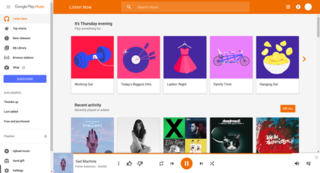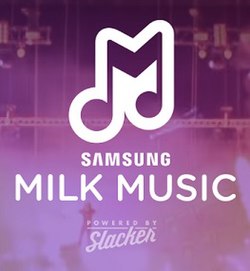
A smartphone is a portable computer device that combines mobile telephone functions and personal computing functions into one unit. They are distinguished from older-design feature phones by their more advanced hardware capabilities and extensive mobile operating systems, which facilitate wider software, access to the internet, and multimedia functionality, alongside core phone functions such as voice calls and text messaging. Smartphones typically contain a number of metal–oxide–semiconductor (MOS) integrated circuit (IC) chips, include various sensors that can be leveraged by pre-installed and third-party software, and support wireless communication protocols. More recently, smartphone manufacturers have begun to integrate satellite messaging connectivity and satellite emergency services into devices for use in remote regions where there is no reliable cellular network.
Pandora is a subscription-based music streaming service owned by Sirius XM Holdings based in Oakland, California, United States. The service carries a focus on recommendations based on the "Music Genome Project"—a means of classifying individual songs by musical traits. The service originally launched in the consumer market as an internet radio service, which would generate personalized channels based on these traits and songs liked by the user; this service is available in an advertising-supported tier, and a subscription-based version. In 2017, the service launched Pandora Premium, an on-demand version of the service more in line with contemporary competitors.
Flixster was an American social-networking movie website for discovering new movies, learning about movies, and meeting others with similar tastes in movies, currently owned by parent company Fandango. The formerly independent site, allows users to view movie trailers as well as learn about new and upcoming movies at the box office. It was originally based in San Francisco, California and was founded by Joe Greenstein and Saran Chari on January 20, 2006. It was also the former parent company of Rotten Tomatoes from January 2010 to February 17, 2016. On February 17, 2016, Flixster, including Rotten Tomatoes, was acquired by Fandango.
7digital Group PLC is a British publicly listed company that offers access to music, tracking and reporting for clients. London-based, 7digital provides end-to-end music services for the fitness, social media, DSPs, and gaming industries with brands such as Barry's and Triller. Advertising Age described 7digital in 2008 as a British download store, while the New York Times referred to them as a digital music company. 7digital's Smooth Operations, Unique Production and Above the Title companies are now branded 7digital Creative, and produce content for BBC Radio 1, Radio 1Xtra, BBC Radio 2 and BBC Radio 3. In 2009 HMV bought 50% of 7digital. In 2019, the company replaced their second CEO, Simon Cole, who had replaced founder/CEO Ben Drury. In February 2023, it was announced 7digital had been acquired by the Santa Monica-headquartered B2B music licensing company, Songtradr.
Deezer is a French music rental service that provides streaming of music, podcasts and video to users in more than 180 countries worldwide. Based in Paris since its 2007 founding, the company has been a subsidiary of Access Industries since 2016. Deezer is available via web (deezer.com) and a number of digital platforms, including Android, iOS, macOS and others.
A music streaming service is a type of streaming media service that focuses primarily on music, and sometimes other forms of digital audio content such as podcasts. These services are usually subscription-based services allowing users to stream digital copyright restricted songs on-demand from a centralized library provided by the service. Some services may offer free tiers with limitations, such as advertising and limits on use. They typically incorporate a recommender system to help users discover other songs they may enjoy based on their listening history and other factors, as well as the ability to create and share public playlists with other users.
UltraViolet was a cloud-based digital rights locker for films and television programs that allowed consumers to store proofs-of-purchase of licensed content in an account to enable playback on different devices using multiple applications from several different streaming services. UltraViolet also allowed users to share access to their library with up to five additional people. UltraViolet was deployed by the Digital Entertainment Content Ecosystem (DECE), an alliance of 85 companies that included film studios, retailers, consumer electronics manufacturers, cable television companies, internet service providers (ISPs), internet hosting vendors, and other systems and security vendors, with the notable exceptions of Walt Disney Studios, Google, Amazon and Apple.

Rdio was an online music streaming service that offered ad-supported free streaming and ad-free subscription streaming services in 85 countries. It was available as a website and via app for Android, BlackBerry, iOS, and Windows Phone mobile devices, which could stream music from Rdio's servers or download music for offline playback; there were also clients for the Roku and Sonos systems. The web-based service also offered a native desktop client application for OS X and Windows, as well as a Windows Store application.
Deepcut.fm, formerly known as Turntable.fm, is a social media website that allows users to collaboratively stream music. The website was co-founded by Billy Chasen and Seth Goldstein in January 2011 after deciding their previous product, Stickybits, was not a viable business. The service allowed users to create "rooms," which other users could join. Designated users, so-called "DJs," chose songs to be played to everyone in that room, while all users were able to talk with one another through a text interface. The service opened to the public in May 2011, and by late June had already reached 140,000 active users. The company used the Digital Millennium Copyright Act to license the music that was played on the website; because of this, only individuals from the United States were allowed to use the service. The site shut down in December 2013, but was revived in March 2021.
Raditaz was an internet radio streaming music service for the web, iOS, and Android. Raditaz was a free product, and users could create stations, listen to over 200 customised stations, and utilize a tagging system to personalize their own stations. Users could find stations not just based on artists, songs, and genres, but also based on metadata tags, such as @work, @gym, #happy, or @driving. Raditaz had a location layer that enables users to listen to and share stations that trending throughout the US. The "explore" feature let a user discover the latest music trends by location. Users could also share songs or stations by email, Facebook, Twitter or Pinterest. Raditaz had more than 23 million songs and used The Echo Nest music intelligence platform for creating stations. When a user input the name of a specific band, artist or song, Raditaz could create a station based on that musician along with similar artists. Users also had the option to add an additional nine artists to customize a station further. Listeners could adjust the popularity level of the artists and songs found within the station. The site went offline in 2012 to undergo a complete makeover, with new features expected. The Raditaz revenue model is location-based advertising, but no target date for ads has been set.

Google Play Music was a music and podcast streaming service and an online music locker operated by Google as part of its Google Play line of services. The service was announced on May 10, 2011; after a six-month, invitation-only beta period, it was publicly launched on November 16, 2011 and shut down in December 2020.
The following is a list of on-demand music streaming services. These services offer streaming of full-length content via the Internet as a part of their service, without the listener necessarily having to purchase a file for download. This type of service is somewhat similar to Internet radio. Many of these sites have advertising and offer non-free options in the style of a digital music store.

Chromecast is a line of digital media players developed by Google. The devices, designed as small dongles, can play Internet-streamed audio-visual content on a high-definition television or home audio system. The user can control playback with a mobile device or personal computer through mobile and web apps that can use the Google Cast protocol, or by issuing commands via Google Assistant; later models introduced an interactive user interface and remote control. Content can be mirrored to video models from the Google Chrome web browser on a personal computer or from the screen of some Android devices.
Google Cast is a proprietary protocol developed by Google for playing Internet-streamed audiovisual content on a compatible consumer device. The protocol is used to initiate and control playback of content on digital media players, high-definition televisions, and home audio systems using a mobile device, personal computer, or smart speaker. The protocol was first launched on July 24, 2013, to support Google's first-generation Chromecast player. The Google Cast SDK was released on February 3, 2014, allowing third parties to modify their software to support the protocol. According to Google, over 20,000 Google Cast-ready apps were available as of May 2015. Support for Google Cast has since been integrated into subsequent devices, such as the Nexus Player and other Android TV devices, as well as soundbars, speakers, and later models of the Chromecast. Consumer devices that natively support the protocol are marketed as Chromecast built-in. As of October 2017, over 55 million Chromecasts and Chromecast built-in devices have been sold.
The Apple TV app is a line of media player software programs developed by Apple Inc. for viewing television shows and films delivered by Apple to consumer electronic devices. It can stream content from the iTunes Store, the Apple TV Channels a la carte video on demand service, and the Apple TV+ original content subscription service. On iPhone, iPad, iPod Touch, and Apple TV devices it can also index and access content from linked apps of other video on demand services.

Yahoo! Inc. is an American multinational technology company that focuses on media and online business. It is the second and current incarnation of the company, after Verizon Communications acquired the core assets of its predecessor and merged them with AOL in 2017. The resulting subsidiary entity was briefly called Oath Inc. In December 2018, Verizon announced it would write down the combined value of its purchases of AOL and Yahoo! by $4.6 billion, roughly half; the company would be renamed Verizon Media the following month in January 2019.
The Samsung Flip is an interactive whiteboard developed by Samsung Electronics and planned for release in 2018. The device was announced during Samsung's keynote speech at CES 2018, with planned distribution in the United States and Europe. It consists of a 55" screen and a dual-sided stylus pen, available for $2,700. Accessories are available to either mount the display on the wall or attach it on a height-adjustable moving stand. The Samsung Flip is aimed at enterprise clients, similar to the Jamboard and Surface Hub.

The Oculus Go is a standalone virtual reality headset developed by Meta Reality Labs in partnership with Qualcomm and Xiaomi. It is in the first generation of Facebook Technologies' virtual reality headsets, and the company's first device in the category of standalone VR headsets, which was a new category at the time of the Go's release. The Oculus Go was unveiled on October 11, 2017 during the Oculus Connect developer conference, and released on May 1, 2018. Xiaomi launched their own version of the headset in China as the Mi VR Standalone on May 31, 2018.

Huddles was an American short-form video hosting service and social network where users could create looping videos that are between 2–16 seconds long. It was created by a team led by Dom Hofmann as a successor to Vine, which Hofmann co-founded, until the project was sold to Clash App, Inc. and subsequently renamed.







